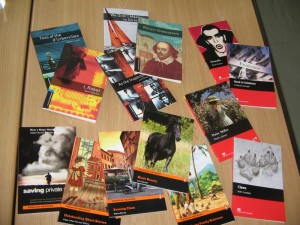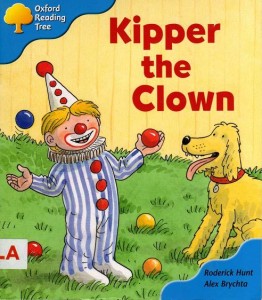curriculum EFL eikaiwa expectations kids language courses Language learning readers Reading school management self-study teaching university
by sendaiben
7 comments
5 Top Extensive Reading Hacks for Teachers
I am a huge fan of extensive reading (ER), and believe it is an essential part of any language course. Also known as FVR (free voluntary reading, although the voluntary part is kind of optional, as you’ll see below), it basically consists of reading a large amount of easily understood text. This usually delivers fairly painless language acquisition, as well as the ancillary benefits of enjoyment and incidental content learning. You can learn more about ER at the Extensive Reading Foundation page.
I’ve been doing ER with Japanese learners since 2004, and have found a few techniques over the years that make a big difference to learners’ progress both inside and outside the classroom.
#1 have students read in class
This is so important. Many students lead busy lives, and reading in English will have a low priority. By giving them time to read in class, we ensure that all students are having the chance to spend at least some time engaged in this crucial activity. Additionally, if students start to read a book in class, the chances that they will then finish it after class increase dramatically.
#2 set achievable goals
Let’s face it, students rarely choose to read in English purely for pleasure. They may do it because they find it useful or because they believe it is a good way to learn, but most of them do so because their teacher asked them to. Finding achievable goals that push your students to read more and more without overburdening them is the key to a successful ER program.
#3 sell reading to your students
This is the foundation that the previous point rests on. It is essential that students understand why they are reading before they start. The principles of ER, guidelines and advice, as well as expected results should be made as clear to the students as possible. If students understand and, more importantly, believe in ER as a method, they are far more likely to succeed.
#4 recommend specific books
Introduce books to students based on their interests and your own. Hopefully you’ll have read all your readers and will be able to recommend specific books based on genre, level, length, and other factors. A personal recommendation makes it much more likely that students will read, and also more likely that they will find a book they like.
#5 give students time to talk about their reading
This may be the most important tip of all. Assuming that most of your students are participating actively in the program, you can harness the power of peer pressure and social proof. If students have time to talk to each other about the books they have been reading, they can share book recommendations and inspire each other to read more. Of course, if many of your students are not participating actively, you may wish to avoid this, as you run the risk of having them drag down the more active ones. It’s just a matter of reading your class to see if this would be beneficial or not.
So, what do you say? Any other good tips for running an ER class or program?
curriculum EFL kids language courses Language learning online resources reviews school management self-study smart.fm technology vocabulary
by sendaiben
10 comments
The Word Engine
I think Koichi at Tofugu sums it up much better than I could, but I was very disappointed to hear the news that smart.fm closed down at the end of March (in order to renege on their pledge to remain a free site).
We’ve now moved all our students onto The Word Engine, an alternative paid site with a lot of nifty features. They have a reasonable sub-2000 yen price point for yearly subscriptions.
What sold it for me was the solid research foundation, the pre-test (V-check) that allows students to skip words they already know, and the teacher management system (V-admin) that makes it easy to keep track of large numbers of students and see how (and how much!) they are doing.
The Word Engine is an online SRS (spaced repetition system) that approaches vocabulary learning based on time boxes.
Signing up for an account is painless and takes less than a minute. Users then take a V-check test, which determines roughly how many words they already know. This is very important, as it allows students to skip items they likely know already and start right away on meaningful practice (this was a big problem with smart.fm, as it forced students to either guess at their level or start from the beginning). Payment is also easy, either online or by ordering access cards directly from Lexxica. Teachers can track their students via a free V-admin account, that shows student progress alongside the total amount of time they have spent studying online. It’s a great tool, as it allows teachers to sort by different variables.
After a few weeks, I really like the system. By far the best part is that practice is pretty much effortless. There is no penalty for getting items wrong, unlike in smart.fm, where students occasionally got really frustrated at being unable to ‘clear’ items. In the Word Engine, there is no downside for getting items wrong: they are just quietly moved back into the first box. Practice is also quick, with each session taking only a couple of minutes at the most.
While I would like to see more visuals and example sentences (things I thought smart.fm did well), these are minor issues.
So far we have over 50 elementary (higher grades), junior high, senior high, university, and adult students on the system. Feedback from the students so far is pretty good and most students are keeping to their 30 minutes a week targets (our best student has completed 22 hours of study in just over a month, and the worst just under 10 minutes, but most students are around the 2-3 hour mark).
If anyone else is using the Word Engine, I’d be really interested to hear how you are finding it.
business curriculum EFL eikaiwa expectations kids language courses Language learning school management teaching
by sendaiben
3 comments
Choice in the classroom
(I’d like to take a short break from earthquake introspection today)
Choice in the classroom
I had a great teaching experience today. It’s so simple that it’s probably not worth writing about, except that it made a big impression on me so there is a slight chance it will also prove useful to others. I was teaching one of our ‘advanced’ classes, made up of promising students that we select and recruit from our general student population (advanced classes are invitation only). This particular class has four girls in it, three junior high school second years and one third year. They’re a great bunch.
We just finished a textbook (Listening Starter 2, published by Compass), and had to decide what to use next. I had something I want to use, but without really having planned to, I pulled out three possible options and introduced each one, then asked the students what they thought. We ended up having a short, to the point, focused discussion about which textbook they wanted to do next, and why.
It wasn’t the one I had chosen.
This is fairly basic stuff. Give the students choice, make them responsible for their learning, give them more autonomy, etc. The thing is, I clearly wasn’t doing it as much as I could have. My students today showed me that they are mature and responsible enough to make these kinds of choices for themselves, and by allowing them to make that choice I maybe managed to convey to them how much I respect and like them. I think I ended up learning the bigger lesson.
It was a great end to a very long day of teaching.
conference curriculum EFL eikaiwa expectations kids Language learning Oxford Reading Tree presentations readers Reading teaching theory Uncategorized
by sendaiben
2 comments
Oxford Teaching Workshop in Niigata (March 12th)
I’ll be presenting again as part of the Oxford Teaching Workshop 2011. It’ll be taking place in Niigata, at the Coop City Hanazono, on Saturday March 12th.
The lineup is as follows:
| Saturday, March 12, 2011 | |
| 10:00-10:30 | Registration |
| 10:30-11:20 | Reading in Class: Opening the Door to an English World Ben Shearon |
| 11:40-12:30 | Teaching Ideas to Add Variety and Spice to your Lessons Ritsuko Nakata |
| 12:30-13:30 | Lunch |
| 13:30-14:20 | What you need to know for Shogakko Eigo Katsudo! Setsuko Toyama |
| 15:00 | Doors Close |
I’ll be talking mainly about using the Oxford Reading Tree and other story books in class. Hope to see some of you there!
conference curriculum EFL expectations JALT language courses Language learning presentations readers Reading teaching theory university
by sendaiben
leave a comment
Extensive Reading Seminar 2011
I just got back from the 2011 ER Seminar, held in Okayama this year.
Had a good time, attended some useful presentations, and saw a bunch of great people. The best conference I have been to in a long time. Especially enjoyed the plenaries and Nakano sensei’s presentation. Got some actionable ideas to adopt(steal) for my classes.
Okayama also seemed like a nice place during the very limited time I was there 🙂
Miles Grogan was kind enough to shoot my presentation for me with my iPhone, so I have finally managed to upload one of my presentations to Youtube:
The quality is not great, but you get the idea. Here are the slides:


